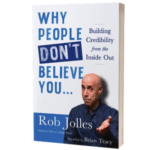 We spend a great deal of time, effort, and training on how to make the sale, and rightfully so. But I want to ask this; what do you do when you do not make a sale? The fact is, no matter how talented you are as a salesperson, no one has a 100% closing ratio. Assuming you have done all that you can do, whether it is over the phone, face to face, Face Time, Skype or in a letter, what happens after the rejection?
We spend a great deal of time, effort, and training on how to make the sale, and rightfully so. But I want to ask this; what do you do when you do not make a sale? The fact is, no matter how talented you are as a salesperson, no one has a 100% closing ratio. Assuming you have done all that you can do, whether it is over the phone, face to face, Face Time, Skype or in a letter, what happens after the rejection?
I have a recommendation, but you’re not necessarily going to like it… yet. I would recommend one last phone call. This call is in no way designed to prod, plead, or convince the customer to give you one more chance. The customer is going to be wary of any potential “sales tricks,” so be ready to clarify the reason for your call immediately. I recommend making this call because it will give you a chance to thank the customer for the opportunity to work for their business, and that call might sound something like this:
Thank you for taking my call. I can appreciate the fact that you have chosen to work with another company moving forward, and I can assure you, I’m not calling today to revisit that decision. That’s a fine company and I hear good things from those who work with them. With your permission, I’d like to follow-up in six months to see how you’re doing. As for me, I plan on being in the business for a long time to come, and as such, I want to keep getting better at what I do for my customers. May I ask, what I could have done better to earn your business?
Please do not be fooled into believing that a letter accomplishes what this phone call accomplishes. It does not. Everyone sends an informal note to the customer, but rarely does this customer get the kind of phone call I have been describing. It takes courage and will earn you respect in the customer’s eyes. Making this phone call will help you in three important ways.
- This call gives you a head start the next time you call on this same customer. By establishing a follow-up time, you have essentially defeated your most difficult nemesis; the phone screener whose job it is to keep salespeople away from decision makers. You’re well within your rights to let the screener know that this customer is expecting your call!
- This call helps you personally. Rejection is the silent killer of many salespeople. It takes its toll on all of us and it probably does more to keep people out of selling than any other factor. Most salespeople are competitive in nature, and no matter how long you work in the selling business, that rejection still hurts. When you ask a customer what you might have done differently to earn their business, the response is always surprising to me. It is usually the following three words: “It wasn’t you.” Many salespeople will tell you that this doesn’t matter to them. Don’t believe them. It is a blow to the salesperson’s ego to lose and it hurts. It is surprising how good it feels to hear that it was nothing that you did personally.
- This call also helps to improve the process you may be following. Was it a misunderstanding that kept you from being successful? Was it the price? Most likely, the customer never understood the true value of your solution or he or she felt no sense of urgency. Remember, this is not the time to fix it. No matter what you hear, learn from it and try to avoid making that same mistake again.
Picking up the phone and calling the customer, after you have lost a sale, can be one of the most difficult calls you will ever make. The rewards, however, far outweigh the negatives. The feedback you receive from your customer will be far better than any advice a sales trainer can offer. This new-found respect from your customer and the feedback you receive can’t be gained by simply writing a letter. It certainly can’t be gained by sending an email. When you do pick up the phone and make this call, be aware of one last thing: Make sure you listen.
 Don’t forget to get your copy of Why People Don’t Believe You. It is now available at bookstores, and available at Amazon in paperback, E-Book, audio book, and CD versions.
Don’t forget to get your copy of Why People Don’t Believe You. It is now available at bookstores, and available at Amazon in paperback, E-Book, audio book, and CD versions.

So helpful, relevant & true!